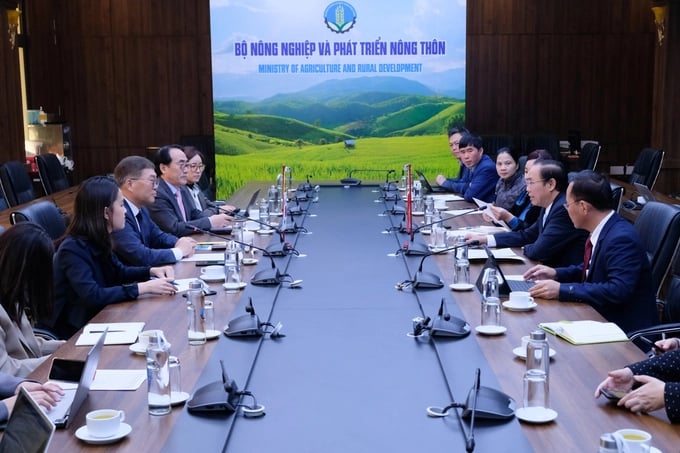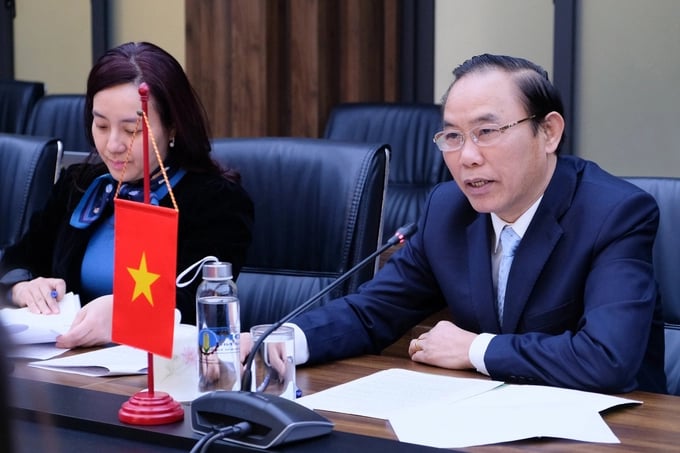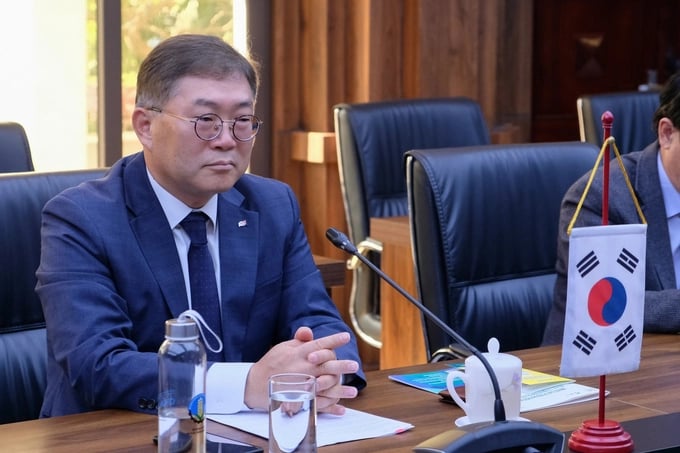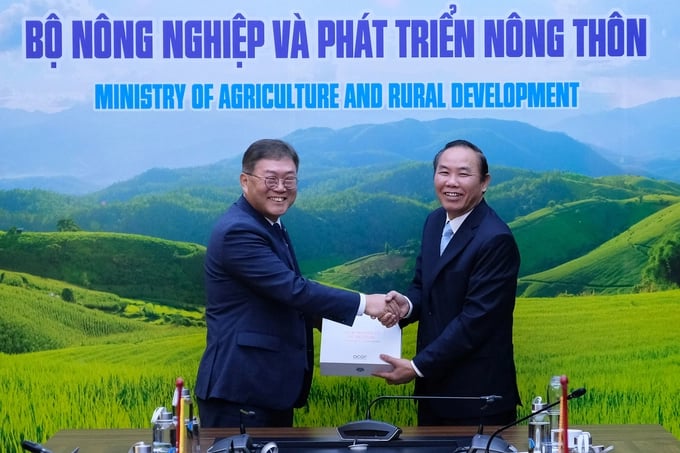June 14, 2025 | 08:37 GMT +7
June 14, 2025 | 08:37 GMT +7
Hotline: 0913.378.918
June 14, 2025 | 08:37 GMT +7
Hotline: 0913.378.918

Deputy Minister Phung Duc Tien worked with KOICA Vietnam Director Cho Han Deog. Photo: Tung Dinh.
On the morning of December 20, Deputy Minister of MARD Phung Duc Tien had a meeting with KOICA Country Director in Vietnam, Mr. Cho Han Deog.
First of all, the Deputy Minister thanked Mr. Cho Han Deog, as the head of the Korea International Cooperation Agency in Vietnam during this term. He has always supported and helped promote bilateral cooperation between the two countries in general and the agriculture and rural development sectors of the two countries in particular.
The Deputy Minister looks forward to continuing to receive support from him and the Korean Government to promote cooperation and development commensurate with the potential of the two countries.
This year marks the 30th anniversary of the establishment of diplomatic relations between the two countries, recently, President Nguyen Xuan Phuc paid a state visit to Korea. The trip strengthens the relationship between Vietnam and Korea into a comprehensive strategic partnership.
"On that basis, MARD is committed to being ready to coordinate with the Korean partner agencies, strengthen cooperation, and maintain the existing good cooperation relationship between the two countries", Deputy Minister Phung Duc Tien confirmed with Mr. Cho Han Deog.
According to him, the Ministry of Agriculture and Rural Development is coordinating with KOICA to build a medium and long-term vision for the cooperation between Vietnam and Korea in the field of agriculture and rural development for the period 2021-2025.
“This is a very important report, thereby identifying potential areas of cooperation to maximize the comparative advantages of the two countries. It also diversifies forms of cooperation and investment in order to improve efficiency and ensure sustainability", the leader of MARD assessed.
Accordingly, the Ministry is expected to finalize the medium and long-term vision for cooperation between Vietnam and Korea in the field of agriculture and rural development in June 2023 and soon send it to KOICA.
However, the Deputy Minister suggested that, the time frame for implementing the Vietnam - Korea medium-long-term vision from 2021-2025 to the period 2023-2030 is in line with reality.

Deputy Minister Phung Duc Tien discussed cooperation issues between Vietnam and KOICA in the field of agriculture. Photo: Tung Dinh.
He also suggested that KOICA continue to support MARD in areas where the Korean side has strengths and priorities of Vietnam. The fields need to be in line with the Master Plan for Agriculture and Rural Development to 2030 and implement the Ministry's Project on Restructuring the Agriculture Sector.
“For the agricultural sector, we have approved the Strategy for Sustainable Agriculture and Rural Development for the period 2021-2030, with a vision to 2050. The Strategy has 3 pillars "Eco-Agriculture - Modern Rural - Civilized Farmers", Deputy Minister Phung Duc Tien told his Korean counterpart.
Specifically, the Ministry of Agriculture and Rural Development is developing a plan to mitigate the sector's greenhouse gas emissions by 2030. It includes a plan to mitigate methane emissions in three areas: cropping, livestock, and forestry.
Accordingly, to implement COP26, Vietnam wishes to promote cooperation with the Korean Government in general and especially KOICA in particular.
One more issue proposed by Deputy Minister Phung Duc Tien is that KOICA coordinates with the focal point of the Department of International Cooperation. This is to develop training programs and improve capacity for management staff, professional staff, and local authorities.

KOICA Country Director in Vietnam Cho Han Deog affirmed that cooperation between the two countries will have more success in the future. Photo: Tung Dinh.
For his part, KOICA Vietnam Director Cho Han Deog affirmed that in the coming time, there will be more exchange activities as well as more effective cooperation between the two countries.
A strength of Vietnam that Mr. Cho Han Deog emphasized is human resources with abundant and diverse labor resources. It is not only limited to the industrial sector but increasingly expanding into the agricultural sector.
In particular, workers in the agricultural industry can well apply scientific and technical advances to reduce labor while still ensuring the quality and quantity of output.

Deputy Minister Phung Duc Tien presented a gift of OCOP Vietnam products to Mr. Cho Han Deog. Photo: Tung Dinh.
In the coming time, KOICA will continue to cooperate with Vietnam in the field of agriculture, focusing on four groups of issues. They are capacity building for management, technology transfer, support for agricultural development associated with climate change response, and enhancement of the value chain for Vietnamese agriculture", KOICA Country Director in Vietnam shared.
In particular, Mr. Cho Han Deog emphasized the training cooperation programs to improve the quality of human resources that KOICA is cooperating with a number of training units of the agricultural industry in Vietnam.
Translated by Hoang Duy
/2025/06/13/5330-2-004539_953.jpg)
(VAN) Changing policy mindset and removing investment barriers are urgent requirements to open up new development space for enterprises in the agricultural sector.

(VAN) The areas include the restoration of five million hectares of marine ecosystems.

(VAN) Dr. Le Van Nguyen, Director of the Institute of E-Commerce Management (ECM), emphasizes the potential for green development through the cultivation of fruit trees, particularly in provinces such as Son La.

(VAN) VAAS and numerous Vietnamese enterprises have signed cooperation agreements with Japanese partners to promote agricultural technology and trade connectivity.
/2025/05/29/5625-12-214801_567.jpg)
(VAN) Provincial mergers in the Mekong Delta promise to streamline administration, expand inter-provincial raw material areas, and foster close linkages in agricultural value chains, benefiting both businesses and cooperatives.

(VAN) Merging Mekong Delta provinces contributes to the expansion of agricultural raw material areas, addressing previous constraints caused by provincial boundaries. Additionally, this expansion will reduce costs and strengthen linkages between businesses, cooperatives, and farmers.
/2025/05/29/1043-2-153730_145.jpg)
(VAN) The Government's policy to merge provincial-level administrative units opens up major opportunities for the Mekong Delta region to reshape its agricultural development strategy toward large-scale production, effective regional linkages, and sustainability.